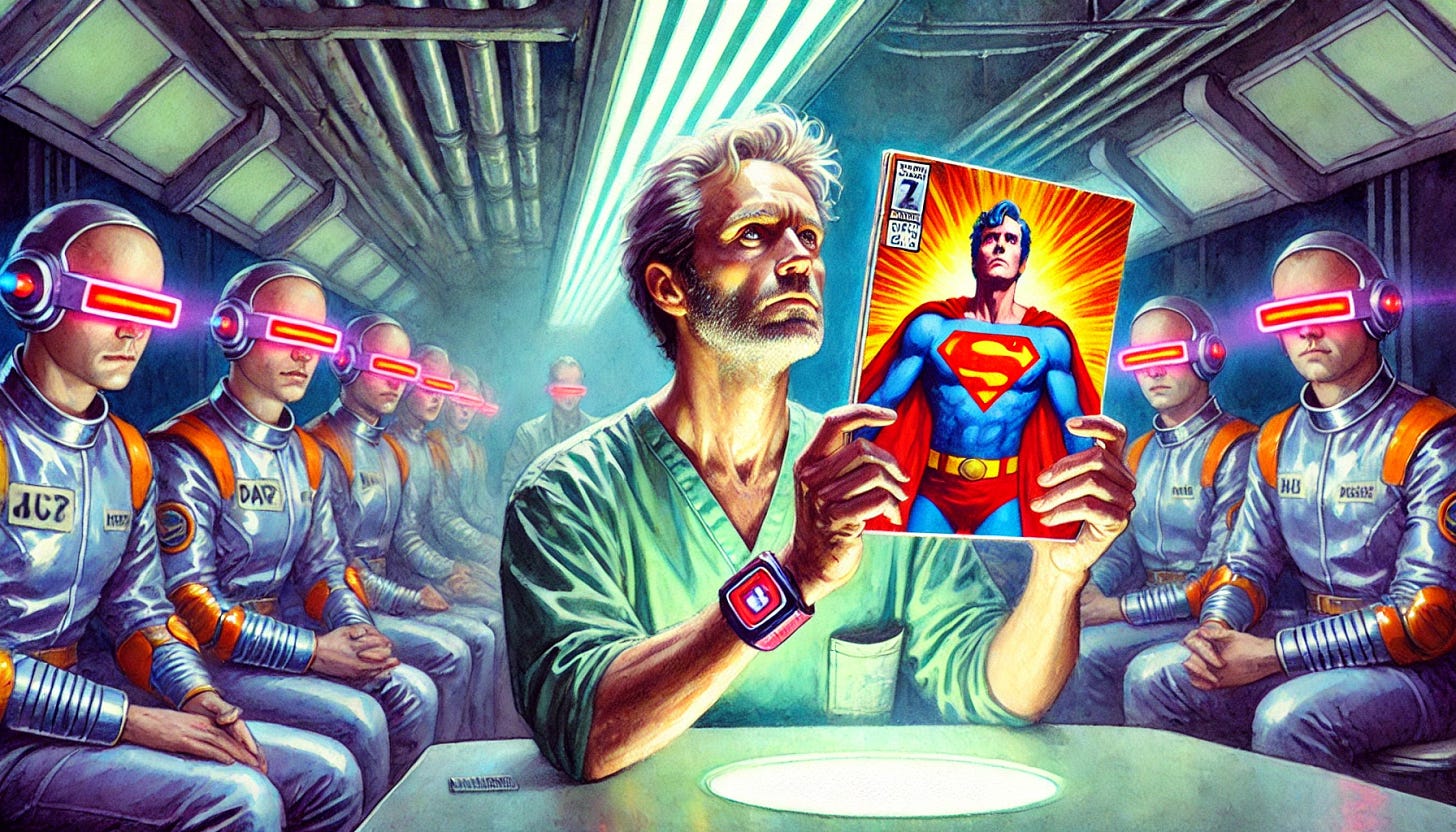Traces
AI. 500 words, 2 minute read. With Claude Sonnet.
The fluorescent strips flickered twice—they always flickered twice at precisely 15:00—as Dale withdrew the contraband from his desk drawer. His fingers trembled, leaving smudges on the plastic sleeve protecting the comic book. Above his steepled hands, he watched the young moderators shift in their seats, their augmented pupils dilating at the sight of actual paper.
The rustle of the page turning echoed in the underground chamber. Dale savored it, like a man tasting the last bite of a meal he'd never have again. A red dot appeared on his wrist, emanating from his smart watch—another loyalty scan. He kept his breathing steady, maintained his pose.
The dot lingered longer than usual.
"This," he said, turning the comic to face his audience, "is Superman. Issue 714." His neural interface hummed as it logged his words. "Notice how the colors have faded. That's what real ink does. It ages. Dies, little by little, like memory itself."
A moderator in the front row—Torres, according to her compliance badge—leaned forward, then caught herself and snapped back straight. "Sir, I don't understand. Why would anyone want media that deteriorates?"
Dale's interface pinged: UNAUTHORIZED DISCUSSION DETECTED. REROUTE CONVERSATION.
He ignored it.
"Look at his face," Dale said instead, tapping Superman's determined expression as he faced down a robot army. "See how the artist used shadows? Every line was drawn by hand. Someone's actual hand."
Torres's fingers twitched, perhaps imagining holding a pencil. The thought-crime alert in Dale's peripheral vision flashed orange.
"Of course," he added smoothly, "our current neural-art synthesis is far superior. More efficient. More..." He paused, letting the word hang. "Optimized."
The notification dismissed itself.
Three seats back, a young man with regulation-cut hair raised his hand. The gesture itself was an anachronism—another small act of rebellion. "The villain Superman is pictured fighting - did they really think machines would be the enemy?"
Dale's laugh came out harder than he intended. "We thought we'd see them coming. Big metal monsters, army of terminators." He gestured at the comic. "We never imagined we'd welcome them in. Install them. Become them."
The loyalty scan dot reappeared, accompanied by a high-pitched whine. Several moderators winced as their interfaces automatically adjusted their thought patterns.
"Time's up," Dale announced, carefully returning the comic to its sleeve. The plastic was wearing thin in one corner. Like the ink, like memory, like resistance—everything faded eventually.
As the moderators filed out, their steps perfectly synchronized by their gait-optimization routines, Torres paused. She glanced at the comic, still visible through the worn sleeve.
"Sir," she whispered, "the Superman in your comic—his colors are fading, but you can still tell what they used to be. Even when they try to wash them away." Her fingers brushed her temple, where her interface pulsed. "Do you think that's why they don't let us have paper anymore? Because memories printed in ink leave traces?"
Dale's interface flashed red: INTELLECTUAL DEVIATION DETECTED. But behind his steepled fingers, a smile formed—the kind that leaves traces too.
"Interesting theory, Torres." He tapped the plastic sleeve. "You know, they say digital is perfect because it never degrades. Always crisp, always bright, always optimized." He paused, meeting her eyes. "But I've noticed something: perfect things are awfully predictable."



